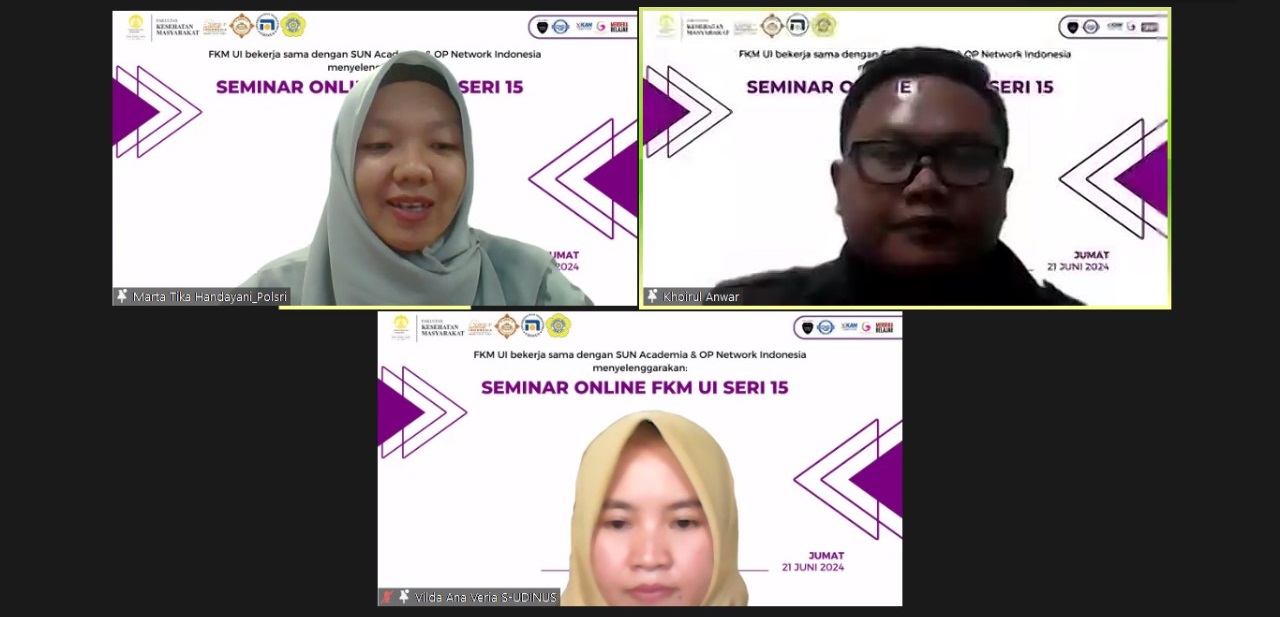On Friday, June 22, 2024, the Faculty of Public Health (FPH) at the Universitas Indonesia (UI) once again organized the 15th series of SEMOL (Seminar Online). In collaboration with SUN Academia & OP Network Indonesia, SEMOL FPH UI presented two expert speakers in the field of nutrition who discussed efforts to prevent stunting.
“This online seminar is held regularly with the purpose of sharing research findings, studies, and community service activities from the members of the SUN Academia network and Professional Organizations. Through this event, we hope to inform and capture opportunities for collaboration and cooperation to improve nutrition in Indonesia,” said Wahyu Kurnia Yusrin Putra, S.K.M., M.K.M., Secretary and Lecturer of the Nutrition Study Program, in his opening remarks.
The INI MASA PENTING (Initiative for Social Mapping and Acceleration of Stunting Prevention Support) activity was presented by Khoirul Anwar, S.Gz., M.Si., from the INI MASA PENTING Committee, Sahid University. INI MASA PENTING is an initiative by AIPGI (Association of Indonesian Higher Education Institutions in Nutrition), in collaboration with nutrition lecturers and students, focused on mapping and supporting efforts to accelerate stunting prevention with the slogan “Prevent Stunting, Smart Children, Happy Mothers, Prosperous Families.” INI MASA PENTING also works in partnership with the National Population and Family Planning Agency (BKKBN) and the Indonesian Rectors Forum (FRI). The goal of INI MASA PENTING is to enhance the convergence process (targeted, integrated, and coordinated) in accelerating stunting prevention at the village level to create smart children, happy mothers, and prosperous families.
INI MASA PENTING has ongoing and completed activities, including competitive grants for nutrition student associations across Indonesia to conduct training, education, and support activities for pregnant women and families. Additionally, there is a stunting determinant mapping activity, which involves collecting information to identify the issues, causes, and strategies to prevent stunting in pregnant women and toddlers. The next activity is mentoring for pregnant women until children reach 2 years old, carried out directly at the village level and posyandu (integrated health posts), involving AIPGI’s Nutrition Study Program or students, which includes education, counseling, referral training, and entrepreneurship development, especially for women, as part of stunting prevention. Lastly, the development of the Early Life Nutrition Academy (ERLINA) was introduced as an online and offline education platform about nutrition and health for prospective brides and pregnant women.
“INI MASA PENTING activities have been conducted from September 2021 to December 2024 at 101 mentoring locations across provinces and districts/cities in Indonesia,” said Khoirul Anwar. “Several indicators are used in the mentoring process every year, with a focus on the targeted objectives. Thus, the activities are aligned with the National Stunting Reduction Acceleration indicators for pregnant women, babies and toddlers, adolescents, prospective brides, and families,” he added.
The second presentation was given by Vilda Ana Veria Setyawati, S.Gz., M.Gizi, a Lecturer at Dian Nuswantoro University, on the topic of “The Role of UKS (School Health Unit) Revitalization in Stunting Prevention Starting from School-Age Adolescents.” “Referring to the Presidential Regulation No. 72 of 2021 on Stunting Reduction Acceleration, adolescent girls are one of the target groups for stunting interventions, yet they are often overlooked,” said Vilda Ana. “When examining the issue cycle, stunting starts with an adolescent girl, so this cycle should be prevented.”
Vilda Ana explained that adolescent girls are only receiving one portion of the specific efforts to accelerate stunting handling in Indonesia, which is the consumption of TTD (Iron Supplements). She also mentioned that there are other nutrition interventions that adolescent girls should receive in addition to TTD, such as Posyandu Remaja (Youth Health Posts) and UKS. UKS aims to improve the quality of education and students’ academic performance by enhancing their health, enabling them to grow and develop optimally into fully capable Indonesian citizens. Revitalizing the role of UKS is essential because most of the activities conducted by adolescents take place at school. “What needs to be revitalized is the return of the Trias UKS, which includes Health Education, Health Services, and the Development of Healthy School Environments,” explained Vilda Rena.
The primary target of UKS development is students. School health cadres are students selected by teachers to provide health services to themselves, their peers, and others in the school community. Involvement of students in school nutrition programs is a critical factor to encourage behavioral change.
“Revitalizing UKS indirectly plays an important role in preventing stunting in the future. The product of UKS revitalization is improved nutrition and the establishment of healthy lifestyle habits for adolescent girls, which are expected to continue in the subsequent life cycles (prospective brides and mothers). Teachers, parents, and students need to collaborate so that UKS can implement the Trias UKS, and Health Cadres must be present in every school,” concluded Vilda Rena. (ITM)

